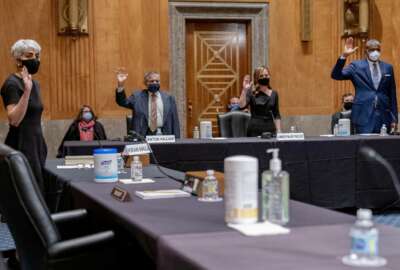Senate confirms Ahuja as first permanent OPM director in more than a year
Vice President Kamala Harris broke a 50-50 tie Tuesday to confirm Kiran Ahuja as the new Office of Personnel Management director.
The Senate on Tuesday narrowly confirmed Kiran Ahuja to be the next director of the Office of Personnel Management, bringing permanent leadership to an agency that has lacked a consistent figure at the top for nearly 14 months.
The Senate voted 51-50 to confirm Ahuja, with Vice President Kamala Harris breaking a 50-50 tie.
Ahuja will be the first South Asian and first Asian American woman to lead OPM.
Her confirmation came under fire in recent weeks from Senate Republicans, who expressed concerns with references and citations Ahuja made to the work of anti-racist scholars. That work has become a flash point for many Senate Republicans in debates over critical race theory.
“I’m concerned that Ms. Ahuja is a disciple of radical critical theorists,” Sen. Josh Hawley (R-Mo.) said Tuesday from the Senate floor.
Hawley questioned Ahuja at April’s confirmation hearing about her opinions on systemic racism, critical race theory and actions the previous administration took to ban certain types of diversity and inclusion training.
She dismissed or avoided most of them and said she understood the role of OPM job and importance of a merit-based civil service system.
“No one should be discriminated based on their race. I was a former civil rights lawyer, and I take that very seriously,” Ahuja said back in April. “I think we all uphold what Martin Luther King Jr. said, which is we should be judged by the content of our character and not the color of our skin. That’s the approach that I’ve taken.”
Sen. Gary Peters (D-Mich.), chairman of the Homeland Security and Governmental Affairs Committee, didn’t address Hawley’s comments Tuesday. He simply called Ahuja a “proven leader” with the “experience and commitment needed to restore confidence in OPM and provide a vision for the future of the federal workforce.”
He referenced “unprecedented challenges” at OPM and inside the federal workforce, from the previous administration’s attempt to break up the agency to the pandemic and recent government shutdown. These challenges were made more difficult without consistent OPM leadership, Peters said.
“The dedicated men and women who serve at OPM and throughout the civil service deserve a qualified, experienced leader who is committed to supporting the people who make government work,” he said. “Throughout this confirmation process Ms. Ahuja has demonstrated that she understands the mission of OPM and the importance of safeguarding the non-partisan civil service. She has committed to working closely and transparently with Congress to strengthen and to modernize the federal workforce.”
Ahuja is a former OPM chief of staff and executive director for the White House Initiative for Asian Americans and Pacific Islanders during the Obama administration. She started her career as a trial attorney through the Justice Department’s honors program and most recently served as CEO of Philanthropy Northwest.
Ahuja will replace Kathleen McGettigan, a long-time career executive who’s been leading OPM on an acting basis since the start of the Biden administration.
OPM had two permanent directors during the last administration, but their tenures were brief. Two others led the agency on an acting basis and served longer than the people they replaced.
At her nomination hearing, Ahuja vowed to bring stable leadership to OPM and said she would stay at the agency as long as she had support from Congress and the president.
Ahuja may take an active role in promoting other key Biden administration priorities, such as advising agencies on their telework and return-to-work plans and elevating diversity, equity, inclusion and accessibility policies in government.
She’ll take on an agency that has at times experienced low morale and turnover among its top executives, as the previous administration’s proposed OPM merger with the General Services Administration created uncertainty and anxiety within the workforce.
The lack of stable, permanent OPM leadership was one of many challenges the National Academy of Public Administration highlighted in a recent report to Congress and the Biden administration, which offered 23 recommendations aimed at improving and refocusing the agency as the federal government’s human capital leader.
Since January, OPM has said it wants to reassert itself as more of a proactive leader in the federal community, and it’s trying to rebuild relationships with employee unions and other human resources practitioner across government.
Multiple employee organizations on Tuesday said they’re especially eager to see Ahuja address longstanding challenges at OPM.
“As the newly confirmed director of OPM, Kiran Ahuja brings a demonstrated commitment to revitalizing the federal workforce and a clear recognition that OPM needs to innovate,” Ken Thomas, national president of the National Active and Retired Federal Employees (NARFE) Association, said in a statement.
The National Treasury Employees Union said Ahuja will bring much-desired stability to the agency.
“The constant turnover at OPM during the last administration and repeated efforts to dismantle the office have been disruptive to the federal workforce, which needs OPM to have steady, professional leadership as it administers federal retirement programs and other human resource management priorities,” Tony Reardon, NTEU national president, said. “We believe Ms. Ahuja will play a vital role in the government’s efforts to protect the health and safety of the federal workforce and ensure that employees are treated with dignity and respect.”
Copyright © 2025 Federal News Network. All rights reserved. This website is not intended for users located within the European Economic Area.
Nicole Ogrysko is a reporter for Federal News Network focusing on the federal workforce and federal pay and benefits.
Follow @nogryskoWFED






